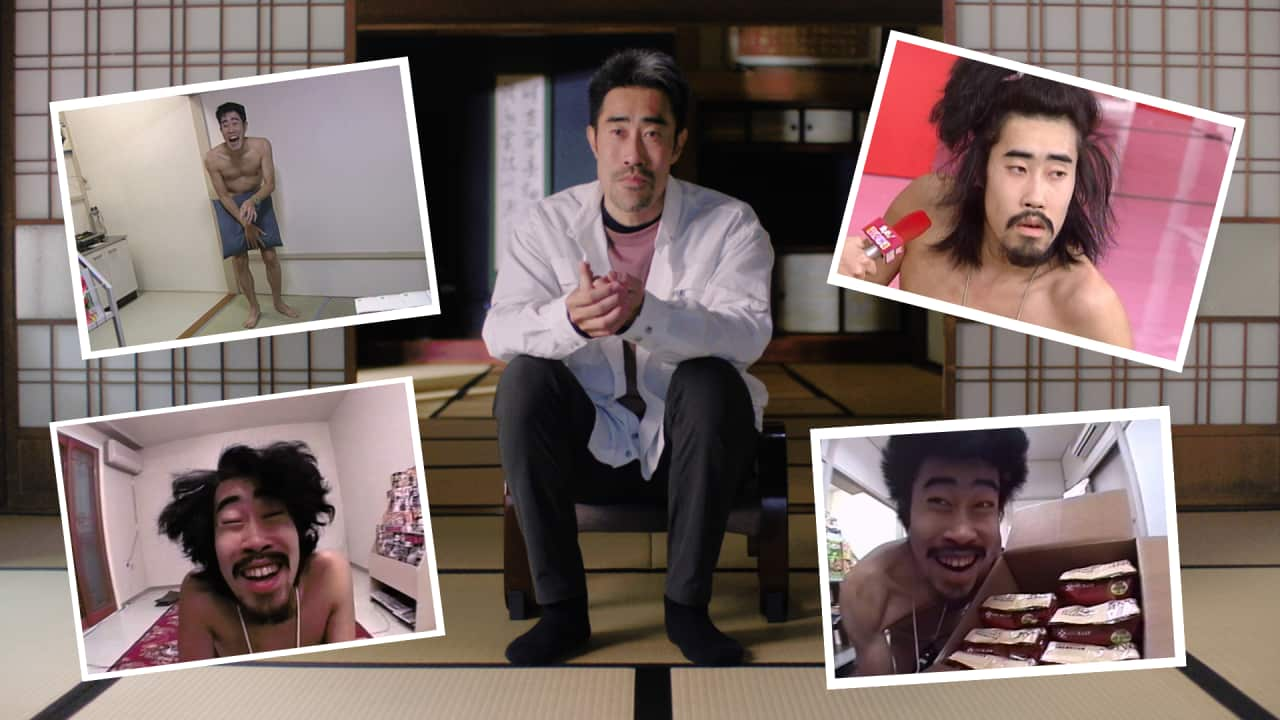Key Points
- Tomoaki Hamatsu, better known as Nasubi, has been dubbed one of the world’s first reality TV stars.
- As part of the '90s Japanese TV series Susunu Denpa Shounen, he spent 15 months confined to an apartment, surviving solely off magazine sweepstakes prizes.
- His story is told in The Contestant, a new documentary that will feature at this year's Sydney Film Festival.
The variety program Susunu Denpa Shounen would fail to meet today's compliance standards, but in the late 1990s it was one of Japan's most-watched television shows.
Each week, 15 million people tuned in to watch as a naked Nasubi attempted to eke out an existence by earning food, clothes and other tools of survival through magazine sweepstakes.
Nasubi said neither he nor the audience really questioned the cruelty of the program at the time.

Nasubi was stripped naked and confined to an apartment. Credit: Adelis Riveiro/Hulu
Twenty-five years later, Nasubi's experience is captured in a new documentary, which will make its Australian premiere at this year's Sydney Film Festival.
The film attempts to uncover the truth behind the show, which many say heralded what we know today as reality television.
The program manager for the festival, Jenny Neighbour, told SBS Japanese that the documentary was selected for its "fascinating, gripping, and totally compelling documentary that’s bizarre, emotional, and eye-opening in equal measure".
British director Clair Titley recalled the shock she felt when first viewing the segment "Life in Prizes" in Susunu Denpa Shounen.
I was shocked and had so many questions: How could this happen? Why did Nasubi stay in there for so long? Did it even really happen?Clair Titley, director
"I wanted to know Nasubi's story most of all, though - how he had navigated his way through such an ordeal and the effect that had had on his life since," she told SBS Japanese.
"I didn’t want to re-traumatise him again. So we approached everything gently and sensitively - but still openly," she added.
In 1998, Nasubi went to an audition for Susumu Denpa Shounen, a program notorious for its crazy challenges which had provided a gateway to success for aspiring comedians.
But it was no ordinary audition. It was a lottery, and Nasubi had no idea what his winnings were.
After show producer Toshio Tsuchiya led him to a room, Nasubi was given the details of his challenge - but he said he was not told that his every move was being filmed and aired on national television.

Nasubi winning the lottery, but without any knowledge of what his "winnings" were. Credit: Adelis Riveiro/Hulu
Yes, I was naked, and I had to win my food too. I even ate dog food at one time. But the most difficult thing was being isolated and cut off from any human interaction.Tomoaki 'Nasubi' Hamatsu
"The task of repeatedly filling in competition forms was mentally stressful too."
Now an established theatre actor, Nasubi admitted that he still grappled with issues of mistrust and loneliness after his ordeal, but agreed to participate in the documentary.
He said interest from people abroad only now discovering the "crazy Japanese program" made him curious about where the documentary might lead.
"How I see Life in Prizes has changed over the years. You can't change the past, but you can change the future by what you do now," he said.
Nasubi said he hoped to dispel his own negativity toward the show and to share a message of resilience.
"I hope to send a message to those vulnerable people, minorities, that things may be difficult now, but you can overcome it, that you are not alone."
Nasubi has already used his TV fame to help people in need, particularly those in Fukushima, his hometown, still recovering from the 2011 earthquake and tsunami.
In 2016, Nasubi climbed Mount Everest to increase awareness of the disaster, and in 2020, he was appointed as the first Fukushima Environmental and Future Ambassador by the Ministry of the Environment, aiming for environmental regeneration of the prefecture, including decontamination, waste treatment and interim storage facility projects.
"I cannot categorise my experience as strictly good or bad; despite going though difficulties, there were still positives," Nasubi said.
"I hope the documentary will help people think about helping others, and realise that even a small happiness can make a human being live a positive life."

Despite the challenges faced, Nasubi said there were still positives from the show. Credit: Adelis Riveiro/Hulu
"Whether it be our complicity in reality TV programming or our relationship to social media. But I’d also hope they come out of it inspired and warmed by Nasubi’s story," she said.
The 71st Sydney Film Festival begins on 5 June, featuring more than 200 titles across 12 days.
Listen to SBS Japanese Audio on Tue, Thu and Fri from 1pm on SBS 3.






